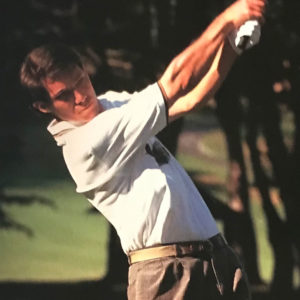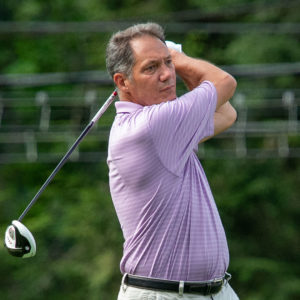For John Salamone, 1991 was one of the most iconic years of his life.

Salamone won the 1991 Massachusetts Amateur at Brae Burn Country Club, one year removed from winning medalist in the event, only to be knocked out in the first round. In the process, he defeated some of Mass Golf’s greats at the time, including Frank Vana, Jr., who was inducted into the Mass Golf Hall of Fame in 2016. He also came the closest to setting the record for the largest margin of victory in the 36-hole match, defeating George Popp, 11-and-9.
At the same time, he and his wife Doreen were expecting the birth of their first child, and soon after the win, they welcomed their first daughter into the world.
Originally from Rochester, New York, Salamone went on to become a standout golfer at LSU. Next, he tried to make the PGA TOUR, but after three years of playing worldwide, he decided to end his pursuit and regain his amateur status. Shortly after, he joined Framingham Country Club alongside Ray Wright, another state amateur great.
Now, 62 Salamone has spent most of the past 30-plus years working in computer software management. While he doesn’t nearly compete as much as in years past, he’s a proud Mass Golfer and devoted member at Framingham.
As the Mass Amateur returns to Brae Burn for the first time since 1991, we look back at the 30th anniversary of Salamone’s victory at Brae Burn and its significance for himself and his family.
Note: This interview was edited for clarity and brevity.
Mass Golf: It’s been 30 years since you took home the title at Brae Burn. What stands out most to you about that day and about that win?
John Salamone: It was a special week, not only because I played well and won, but one of the qualifiers was at Framingham Country Club where I’m a member. We had 10-plus members qualify, so there was a big contingent of Framingham guys who made it at Brae Burn. The club even bought us team shirts, and we all wore them on the first day, so it was almost like a team event. Also, it was nearby, so there were no overnights. So it was a nice start to the week.
MG: You said back then that winning this would be more important than winning any other event, why was this so important to you?
JS: In 1990, I moved from New York to Massachusetts and started playing a lot of the amateur stuff. I played well in 1990 and won individual titles. In the 1990 Mass Amateur at Kittansett, I was a favorite, then won [stroke-play medalist], but then lost my first match. I was a little disappointed. I didn’t play well that morning when I got beat. And then you have to wait a year to get another shot. So going into Brae Burn, my thought was don’t be a medalist; that’s kind of a curse, and I wasn’t, but then I thought, let’s take one match at a time. It was a strong bracket, but it was a bit of redemption.
MG: Not only did you win, but you also had your first child on the way. Was that on your mind all week?
JS: In the final, I had [Former Mass Golf Executive Director] Dick Haskell driving my wife around in the cart. Dick’s son RD had just had his first child a couple of months prior. He was sensitive to what my wife needed while she was there, yet she wanted to watch, and I was glad she was there. When you’re playing well and playing in front of family and friends, that’s just storybook stuff.
MG: Were ever a leaderboard watcher, even before it was all digitized?
JS: I’ve always wanted to know where I stand. I was taught a long time ago that it was OK to be nervous. The person who deals with their nerves the best, they’re the ones who tend to be least affected. It will change potential shot decisions. In my final match against George [Popp], I got off to a big start against him. After 18, I was 7-up. Once you start getting 3 or 4 up early in the match, you don’t have to go for pins. George was forced to start taking chances and going for pins that he may not have wanted to if the match was even.

MG: Was there a point during the final match where it really started to set in that you were going to win this thing?
JS: After 18 holes, I just wanted to win the thing. Either I was winning big or going down in history as blowing such a huge lead, which was certainly not my intent. When I made the last winning putt, I wasn’t sure the match was actually over until Sandy Dowling (the match official) told me that was it. I was trying to lag about a 20-foot putt to get it close to the hole, and it went in. I wasn’t expecting to win the match that way.
You were fairly new to Framingham CC when you won the Mass Amateur. How were you received before and after that win?
The membership is great. When I first moved to Massachusetts, I had a childhood friend who was already a member, and he took me out 2-or-3 times as a guest. That’s where I met Ray Wright (1990 Mass Amateur champion) and Larry LaCasse (Salamone’s caddy for 1991 Mass Amateur). There are many great players, a lot of good people, and it’s close to my home. It was a no-brainer for me to join.
After I won, the club put on a big testimonial dinner. It was exciting because the night of my dinner was the day my daughter was born. My parents and my sisters were always in town for the dinner, and my wife went into labor that morning. We had the baby, and I was actually running late, so the dinner started without me. I had to run into the dinner. As everybody was eating, I had to go to the microphone to talk about the birth and then the week at Brae Burn. It was very nice and well attended. After dinner, my parents and my sisters all drove back to introduce them to my daughter.
You tried to make it on the PGA TOUR, but it didn’t work out. Do you still have thoughts of what if?
I try to get down to TPC Boston at least every time to watch the guys in Boston. I’ve made it to Augusta National a few times to see the guys I played against. I always think, what if, but that’s a tough life. You don’t see the guys struggling to make it week-to-week and make cuts and ends meet. I was lucky enough to have a sponsor and not have to worry about the money. I missed my card by two shots on my first try, but I was exempt for the Korn Ferry Tour, European Tour, Canadian Tour. I also played on the Asian Tour and in Monday qualifiers. I got to see parts of the world and the country I probably would never see. I made some great friendships. I have no regrets about how my career started, stopped, and started again. Amateur golf is fun when you take out the business side. Everybody is there to have a good time, but it’s not the most important thing in a players’ life.
What did it mean to play in the Ouimet Memorial Tournament last year at Framingham CC and get a chance to compete with all these guys you went up against all those years ago?
The reason I did it is I hadn’t played in a while. I had a herniated disk in my back, so I couldn’t play golf for two years. I did injections because I didn’t want surgery. It’s still not 100%, but my sister was able to play in the Women’s Division and talked me into it. As soon as I was around the pro shop, coming down Hole 9 were Frank Vana and Jack Kearney, guys that I played against, and we battled almost every time we were in tournaments together. Both those guys gave me a big hug and said, ‘Finally, you’re back.’ It was really nice to reaffirm that you’re missed on the amateur circuit. That was really special. I’ll definitely get back to play more events because it’s definitely worth the time.

With the Amateur coming to Framingham CC in 2024, any thoughts of trying to qualify again?
Absolutely. It’s always been a great layout. The Superintendent [Patrick Daly] has done a great job. Club management has been doing a great job. We had a ton of great players back 30 years ago. We have some incredible players now. Many guys have plus handicaps and are shooting in the 60s on any given day. I think Framingham will be a great test. I know the course will be up for the challenge; it’ll just be a matter of if my game is.